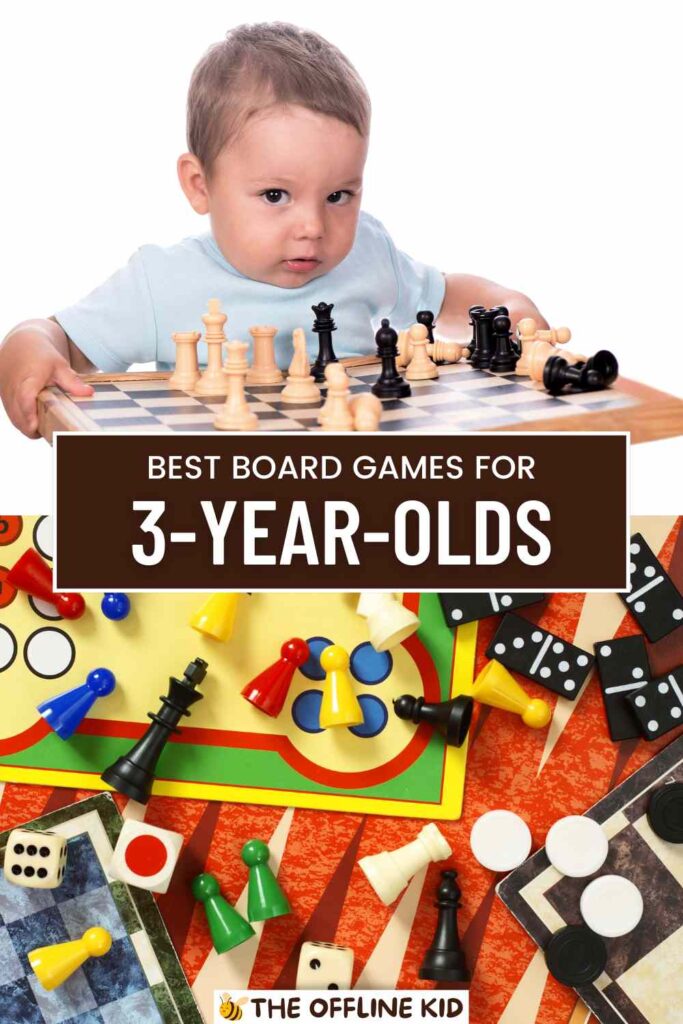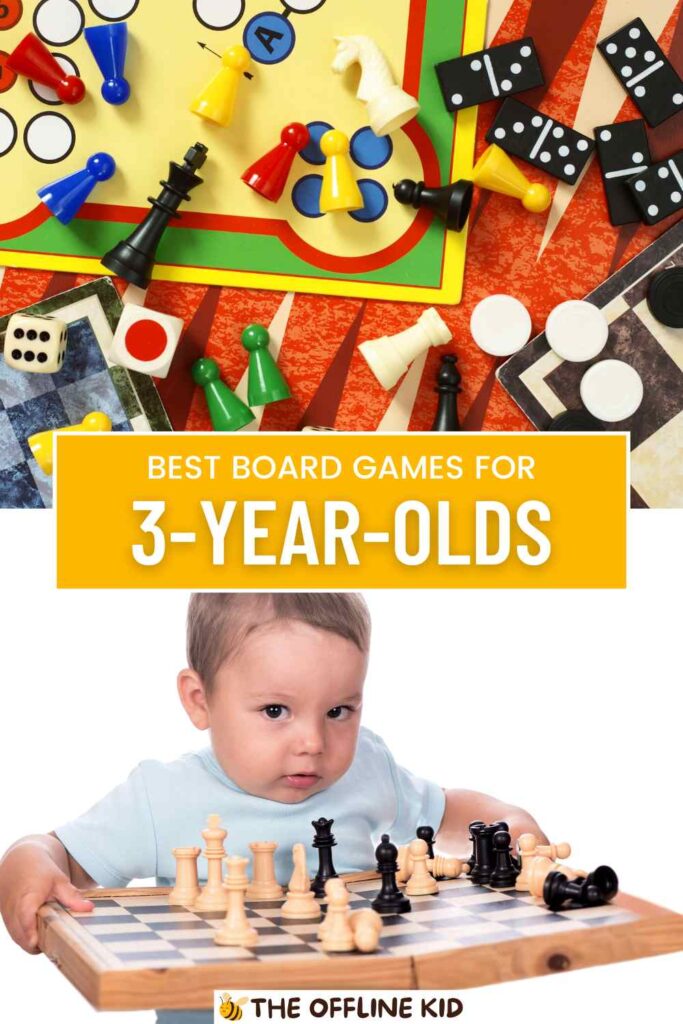Board games are an excellent way to foster early childhood development. They teach critical skills like counting, color recognition, and teamwork.
Here, we explore over 25 engaging and educational board games perfect for 3-year-olds.
Criteria for Choosing Board Games for 3-Year-Olds
Choosing the right board game for your 3-year-old can make a significant difference in their enjoyment and learning experience. Here are some essential criteria to consider:
Safety Considerations
- Non-toxic materials: Ensure the game components are made from non-toxic materials to avoid any health risks.
- Choking hazards: Avoid games with small pieces that could be a choking hazard.
- Durable construction: Look for sturdy and well-made games that can withstand rough handling.
Educational Value
Board games for young children should offer educational benefits. Look for games that:
- Promote basic skills: Counting, color recognition, and shape identification.
- Encourage cognitive development: Memory games, pattern recognition, and problem-solving.
- Enhance social skills: Games that require taking turns, sharing, and cooperative play.
Engagement and Fun Factor
- Colorful and appealing design: Bright, vibrant colors and attractive themes can capture a child’s attention.
- Simple rules: Games should have easy-to-understand rules that a 3-year-old can grasp quickly.
- Short playtime: Games with shorter durations are ideal to match the attention span of young children.
Age-Appropriate Complexity
- Simple gameplay mechanics: Choose games with straightforward instructions and minimal steps.
- Level of challenge: The game should be challenging enough to be engaging but not so difficult that it becomes frustrating.
Durability and Quality of Materials
- High-quality materials: Ensure the game components are made from durable materials that can endure frequent use.
- Easy to clean: Games should be easy to clean and maintain, especially since young children can be messy.
By considering these criteria, you can select board games that are not only fun and engaging but also safe and educational for your 3-year-old.
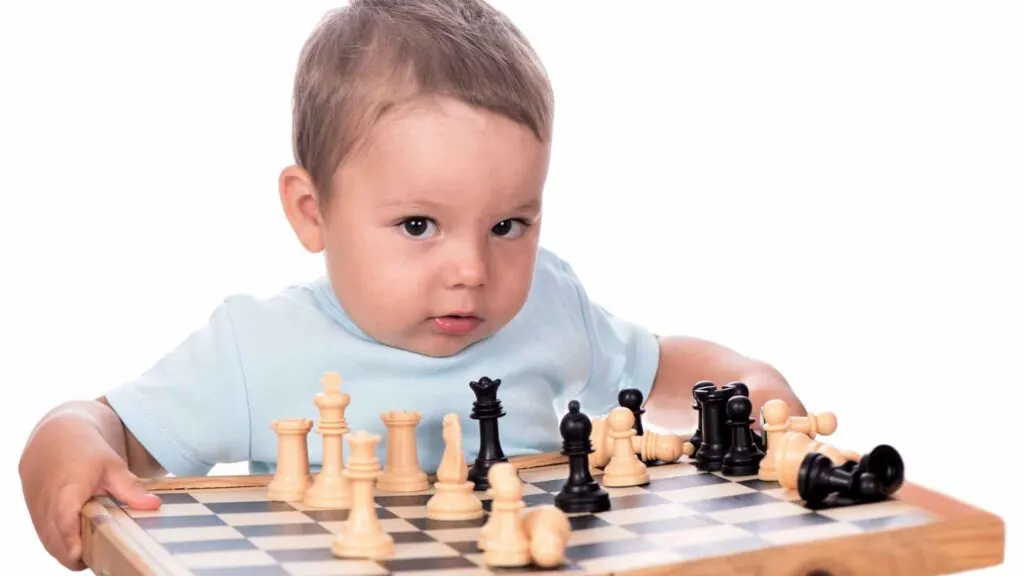
Classic Board Games for 3-Year-Olds
Classic board games have stood the test of time for a reason—they are engaging, simple, and educational. Here are some timeless favorites that are perfect for 3-year-olds:
Candy Land
- Overview and Gameplay: Candy Land is a color-matching game where players move their pieces along a colorful path to reach King Kandy’s Castle. Players draw cards to see which color space they move to next.
- Educational Benefits:
- Color recognition: Children learn to identify and match colors.
- Counting and sequencing: The game introduces basic counting and sequencing skills as players move along the board.
Chutes and Ladders
- Overview and Gameplay: Chutes and Ladders is a simple counting game where players move their pieces up ladders and down chutes based on the spin of a spinner. The goal is to reach the top of the board.
- Educational Benefits:
- Number recognition and counting: Players practice counting as they move their pieces.
- Understanding consequences: The game teaches the concept of consequences through the chutes and ladders.
Hi Ho! Cherry-O
- Overview and Gameplay: Hi Ho! Cherry-O is a counting game where players take turns spinning a spinner to collect or lose cherries, apples, blueberries, or oranges from their tree. The first player to collect all their fruit wins.
- Educational Benefits:
- Counting and basic math: Players practice counting and simple addition and subtraction.
- Fine motor skills: Picking up and placing the small fruit pieces helps develop fine motor skills.
These classic board games offer simple, engaging gameplay that is perfect for young children. They provide a mix of fun and educational value, making them great choices for 3-year-olds.
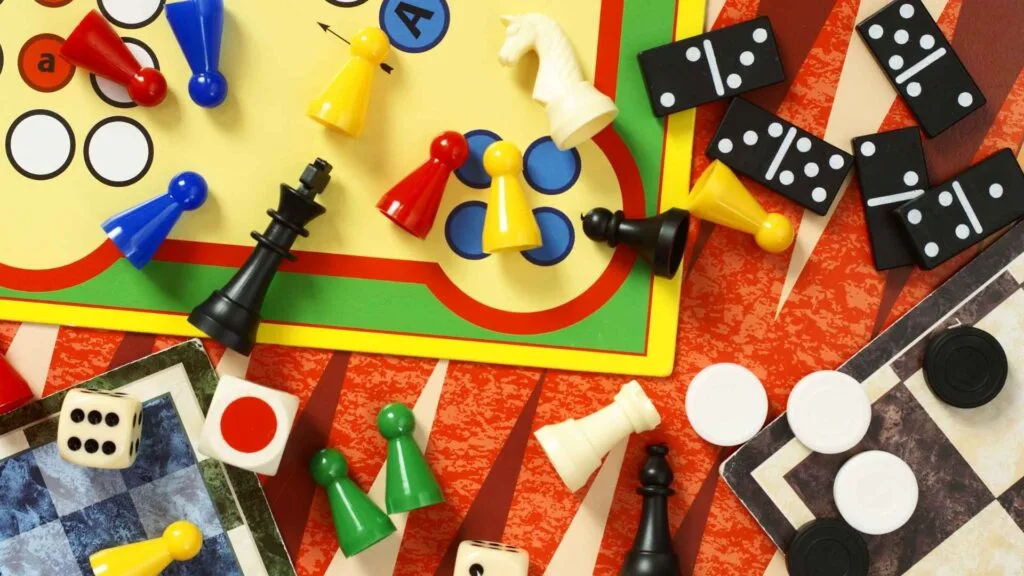
Educational Board Games
Educational board games are designed to be both fun and instructional, helping children develop essential skills while playing. Here are some excellent educational board games for 3-year-olds:
The Sneaky, Snacky Squirrel Game
- Overview and Gameplay: In The Sneaky, Snacky Squirrel Game, players take turns spinning a spinner and using a squirrel-shaped grabber to collect acorns matching the colors on their logs. The first player to collect all their acorns wins.
- Educational Benefits:
- Color recognition: Children learn to identify and match colors.
- Fine motor skills: Using the grabber to pick up acorns helps improve hand-eye coordination and fine motor skills.
- Strategic thinking: Players must decide which acorns to collect and when to use special actions like stealing or losing acorns.
Zingo!
- Overview and Gameplay: Zingo! is a fast-paced matching game where players try to match tiles to the images on their Zingo! cards. The first player to fill their card shouts “Zingo!” to win.
- Educational Benefits:
- Language development: Players enhance their vocabulary and word recognition by matching tiles with pictures and words.
- Memory and concentration: The game improves memory and concentration as players try to remember which tiles they need.
- Social skills: Taking turns and playing together fosters cooperative play and social interaction.
Richard Scarry’s Busytown: Eye Found It!
- Overview and Gameplay: In Richard Scarry’s Busytown: Eye Found It!, players work together to find hidden objects on a giant, six-foot-long game board. Players spin the spinner and move their pieces through Busytown, using magnifying glasses to spot objects along the way.
- Educational Benefits:
- Observation skills: The game encourages players to pay attention to details and find hidden objects.
- Teamwork: As a cooperative game, it promotes teamwork and collaboration among players.
- Vocabulary building: Players learn new words and concepts through the various objects they need to find.
These educational board games provide a blend of fun and learning, making them ideal for 3-year-olds. They help children develop essential skills in a playful and engaging way.
Cooperative Board Games
Cooperative board games are excellent for fostering teamwork and collaboration among young children.
These games encourage players to work together towards a common goal, promoting social skills and a sense of community. Here are some top cooperative board games for 3-year-olds:
Hoot Owl Hoot!
- Overview and Gameplay: In Hoot Owl Hoot!, players work together to help the owls fly back to their nest before the sun rises. Players draw color-coded cards and move any owl to the next matching color space. Special sun cards advance the sun along its track.
- Educational Benefits:
- Color recognition: Players learn to identify and match colors.
- Teamwork: The cooperative nature of the game encourages players to discuss strategies and make decisions together.
- Problem-solving: Players must think ahead and plan their moves to get all the owls home before sunrise.
Stone Soup
- Overview and Gameplay: Stone Soup is a cooperative memory game where players work together to find and match ingredients to add to the soup pot. If players can match all the ingredients before the fire under the pot is completed, they win.
- Educational Benefits:
- Memory skills: Players practice memory and matching skills by remembering the locations of ingredients.
- Collaboration: The game encourages players to share information and work together to achieve a common goal.
- Turn-taking: Players learn the importance of taking turns and waiting for their turn to play.
Count Your Chickens!
- Overview and Gameplay: In Count Your Chickens!, players work together to help Mother Hen collect all her chicks and bring them back to the coop. Players take turns spinning a spinner and moving the Mother Hen along the board, collecting chicks along the way.
- Educational Benefits:
- Counting: Players practice counting as they collect chicks and move around the board.
- Cooperation: The game fosters a sense of teamwork as players work together to gather all the chicks.
- Strategy: Players must plan their moves to ensure all chicks are collected before reaching the end of the board.
These cooperative board games provide a wonderful opportunity for 3-year-olds to learn the value of working together and supporting each other. They combine fun gameplay with important social and cognitive skills development.
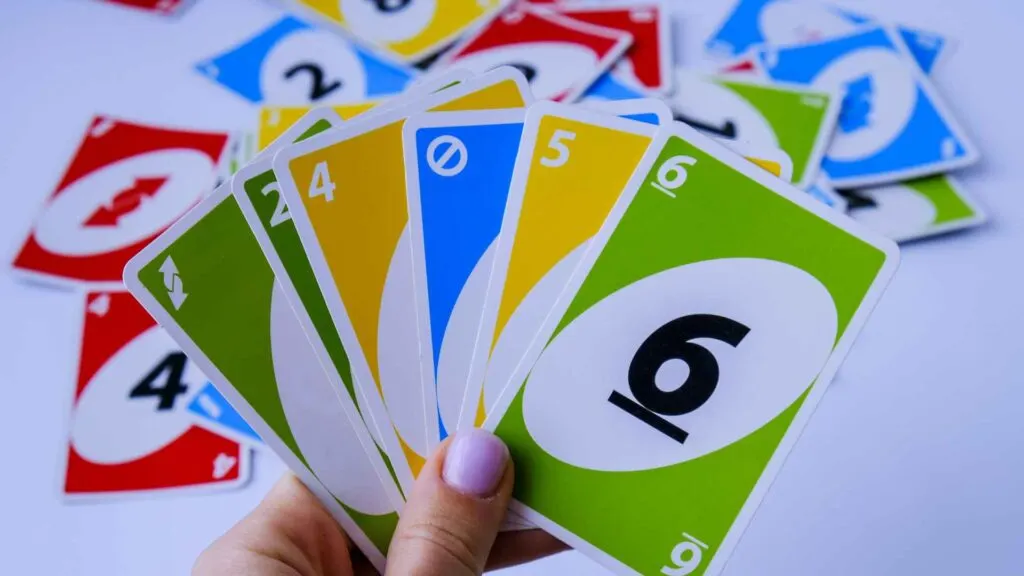
Adventure and Imaginative Play Board Games
Adventure and imaginative play board games spark creativity and curiosity in young children.
These games allow kids to explore new worlds, engage in storytelling, and develop problem-solving skills. Here are some fantastic adventure and imaginative play board games for 3-year-olds:
Wonder Forge Richard Scarry’s Busytown Game
- Overview and Gameplay: In Richard Scarry’s Busytown Game, players race around a giant game board filled with bustling city scenes. Using magnifying glasses, players search for hidden objects as they move their pieces to Picnic Island.
- Educational Benefits:
- Observation skills: The game enhances attention to detail as players search for hidden objects.
- Teamwork: Players work together to find items, promoting cooperative play.
- Vocabulary building: The variety of objects and scenes introduces new words and concepts.
The Ladybug Game
- Overview and Gameplay: The Ladybug Game is a charming adventure where players help ladybugs find their way home while avoiding aphids and collecting aphid cards to feed the ants. Players move their ladybugs by drawing cards with instructions.
- Educational Benefits:
- Counting and number recognition: Players practice counting and recognizing numbers on the cards.
- Strategic thinking: The game involves simple strategy as players decide the best path for their ladybugs.
- Storytelling: The narrative of helping ladybugs adds a storytelling element that engages young minds.
My First Carcassonne
- Overview and Gameplay: My First Carcassonne is a simplified version of the classic game Carcassonne, designed for younger players. In this game, players place tiles to build a landscape and add their pieces (meeples) to roads, trying to complete them.
- Educational Benefits:
- Spatial awareness: Players develop spatial reasoning by placing tiles to complete roads.
- Counting: Players count their meeples and completed roads.
- Turn-taking: The game teaches patience and turn-taking skills as players wait for their turn to place a tile.
These adventure and imaginative play board games encourage creative thinking and storytelling in 3-year-olds. They provide a fun and engaging way for children to explore new worlds and develop important cognitive and social skills.
Fine Motor Skills Development Board Games
Fine motor skills are essential for young children as they develop the ability to control small movements with their hands and fingers.
Board games that focus on fine motor skills can be both fun and beneficial. Here are some excellent board games for 3-year-olds that help develop fine motor skills:
HABA My Very First Games – First Orchard
- Overview and Gameplay: First Orchard is a cooperative game where players work together to harvest fruit from trees before the raven reaches the orchard. Players roll a die to determine which fruit to pick and place it in their basket.
- Educational Benefits:
- Fine motor skills: Picking up and placing the wooden fruit pieces helps develop hand-eye coordination.
- Color recognition: Players learn to identify and match colors.
- Teamwork: The cooperative nature of the game encourages collaboration and communication.
Stack Up!
- Overview and Gameplay: In Stack Up!, players work together to stack blocks on top of each other to build a tower before the Stack Smasher knocks it down. The game includes challenges that require players to use different stacking techniques.
- Educational Benefits:
- Fine motor skills: Stacking blocks requires precise hand movements and balance.
- Problem-solving: Players must figure out how to stack blocks effectively.
- Teamwork: The cooperative aspect of the game promotes working together and supporting each other.
Feed the Woozle
- Overview and Gameplay: Feed the Woozle is a cooperative game where players take turns feeding the Woozle silly snacks using a spoon. Players roll a die to see how many snacks to feed and must balance them on the spoon while walking to the Woozle.
- Educational Benefits:
- Fine motor skills: Balancing snacks on a spoon improves hand-eye coordination and control.
- Counting: Players practice counting as they feed the Woozle the correct number of snacks.
- Gross motor skills: Walking while balancing snacks enhances gross motor skills and body coordination.
These fine motor skills development board games are not only enjoyable for 3-year-olds but also help them improve their hand-eye coordination, dexterity, and precision. They combine play with physical development, making them ideal for young children.
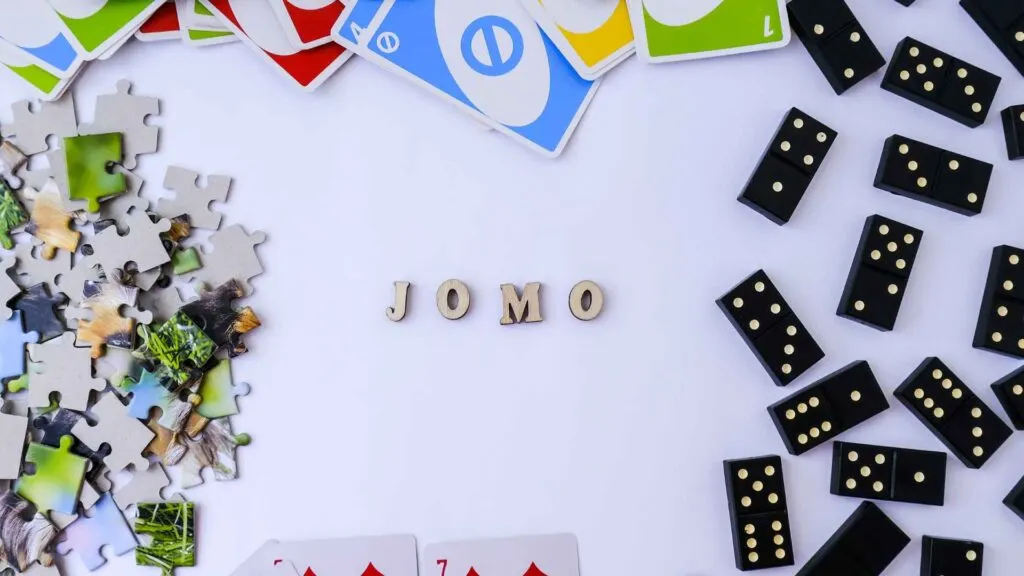
Memory and Matching Board Games
Memory and matching games are perfect for enhancing cognitive skills such as memory, concentration, and pattern recognition in young children.
Here are some excellent board games for 3-year-olds that focus on these skills:
First 100 Words Matching Game
- Overview and Gameplay: Based on the popular book “First 100 Words,” this matching game features colorful picture cards that players must match with their corresponding words. Players take turns flipping cards to find pairs.
- Educational Benefits:
- Memory skills: Players improve their memory by remembering the locations of matching cards.
- Vocabulary building: The game introduces new words and reinforces language development.
- Concentration: Players enhance their focus and attention as they search for matches.
Memory Game (various themes)
- Overview and Gameplay: The classic Memory Game comes in various themes, such as animals, shapes, or favorite characters. Players take turns flipping over cards to find matching pairs.
- Educational Benefits:
- Memory skills: The game strengthens memory through the recall of card positions.
- Pattern recognition: Players learn to identify and match patterns.
- Turn-taking: The game teaches patience and the importance of waiting for one’s turn.
Go Fish
- Overview and Gameplay: Go Fish is a classic card game where players ask each other for specific cards to make pairs. If the player asked doesn’t have the card, they say “Go Fish,” and the asker draws from the deck.
- Educational Benefits:
- Memory skills: Players must remember which cards they and their opponents have asked for.
- Social skills: The game encourages interaction and communication between players.
- Counting: Players practice counting as they collect pairs of cards.
These memory and matching board games are not only entertaining for 3-year-olds but also crucial for developing their cognitive abilities. They provide a fun way for children to improve their memory, concentration, and pattern recognition skills.
Counting and Number Recognition Board Games
Counting and number recognition are fundamental skills for young children. Board games that focus on these skills can make learning numbers fun and interactive.
Here are some excellent counting and number recognition board games for 3-year-olds:
Count Your Chickens
- Overview and Gameplay: In Count Your Chickens, players work together to help Mother Hen collect all her chicks and bring them back to the coop. Players take turns spinning a spinner and moving the Mother Hen along the board, collecting chicks along the way.
- Educational Benefits:
- Counting: Players practice counting as they collect chicks and move around the board.
- Cooperation: The game fosters teamwork as players work together to gather all the chicks.
- Strategy: Players plan their moves to ensure all chicks are collected before reaching the end of the board.
Snug as a Bug in a Rug
- Overview and Gameplay: Snug as a Bug in a Rug is a cooperative game where players work together to match bugs under the rug before the stink bugs stink up the place. Players spin a spinner and match bugs based on color, shape, or number.
- Educational Benefits:
- Number recognition: Players learn to recognize numbers on the spinner and match them to the bugs.
- Color and shape recognition: The game also teaches color and shape recognition.
- Teamwork: The cooperative aspect encourages players to work together and make decisions as a group.
Number Bingo
- Overview and Gameplay: Number Bingo is a classic bingo game adapted for young children, where players match numbers on their bingo cards with numbers called out. The first player to match a row of numbers shouts “Bingo!” to win.
- Educational Benefits:
- Number recognition: Players learn to recognize and match numbers on their cards.
- Listening skills: The game enhances listening skills as players pay attention to the numbers called out.
- Concentration: Players improve their focus and concentration while searching for numbers on their cards.
These counting and number recognition board games are ideal for 3-year-olds, providing an enjoyable way to learn and practice essential math skills. They make learning numbers fun and engaging, helping children develop a strong foundation in early math.
Color Recognition Board Games
Color recognition is an essential skill for young children, and board games that focus on this can be both fun and educational. Here are some excellent color recognition board games for 3-year-olds:
Colorama
- Overview and Gameplay: Colorama is a simple game where players roll dice and place colorful shapes into matching slots on the game board. The goal is to match all the shapes to the correct colors.
- Educational Benefits:
- Color recognition: Players learn to identify and match colors.
- Shape recognition: The game also helps with shape recognition and differentiation.
- Fine motor skills: Picking up and placing the pieces helps develop fine motor skills.
Candy Land (focus on color recognition)
- Overview and Gameplay: In Candy Land, players move their pieces along a colorful path to reach King Kandy’s Castle. Players draw cards to see which color space they move to next.
- Educational Benefits:
- Color recognition: The game is great for teaching children to identify and match colors.
- Turn-taking: Players learn to take turns and follow game rules.
- Counting: While not the primary focus, the game also introduces basic counting as players move their pieces.
Color Clash
- Overview and Gameplay: Color Clash is a fast-paced game where players match colors on cards as quickly as possible. The game features multiple ways to play, including matching colors, shapes, or both.
- Educational Benefits:
- Color recognition: The game reinforces color identification and matching.
- Speed and accuracy: Players practice quick thinking and accuracy in matching colors.
- Attention to detail: The game enhances observational skills as players look for matching colors and shapes.
These color recognition board games are perfect for 3-year-olds, combining fun gameplay with educational value. They help children learn to identify and match colors, improving their visual perception and cognitive skills in an engaging way.
Social and Emotional Learning Board Games
Social and emotional learning (SEL) is crucial for young children as it helps them understand their emotions, develop empathy, and build strong interpersonal skills.
Here are some excellent board games for 3-year-olds that focus on social and emotional learning:
Feelings and Dealings
- Overview and Gameplay: Feelings and Dealings is a card game designed to help children recognize and express their emotions. Players take turns drawing cards that depict various emotions and discuss times when they have felt those emotions.
- Educational Benefits:
- Emotional recognition: Players learn to identify and name different emotions.
- Communication skills: The game encourages children to talk about their feelings and experiences.
- Empathy: By hearing others’ experiences, children develop a sense of empathy and understanding.
Emotions Detective
- Overview and Gameplay: Emotions Detective is a cooperative game where players work together to solve mysteries by identifying characters’ emotions based on clues. Players use an emotion wheel and cards to determine how the characters are feeling.
- Educational Benefits:
- Emotional awareness: The game helps children recognize and understand various emotions.
- Problem-solving: Players use clues to deduce characters’ emotions, enhancing critical thinking skills.
- Cooperation: The cooperative nature of the game fosters teamwork and collaborative problem-solving.
The Ungame
- Overview and Gameplay: The Ungame is a conversation-based game where players move around the board and answer questions or discuss topics about their feelings, experiences, and opinions. It’s designed to be non-competitive and open-ended.
- Educational Benefits:
- Communication: The game encourages open communication and active listening.
- Self-expression: Players learn to express their thoughts and feelings.
- Social skills: The game promotes sharing, empathy, and understanding among players.
These social and emotional learning board games are ideal for 3-year-olds, providing a fun and interactive way to develop emotional intelligence and social skills.
They help children understand their own feelings and relate to others, laying the foundation for healthy emotional and social development.
Conclusion
Board games are a wonderful way to foster early childhood development through play.
From classic games like Candy Land and Chutes and Ladders to innovative educational games like The Sneaky, Snacky Squirrel Game and Count Your Chickens, there is a wide variety of options to suit every child’s interests and developmental needs.
Whether focusing on fine motor skills, memory, counting, color recognition, or social-emotional learning, these games provide a fun and engaging way for 3-year-olds to learn and grow.
